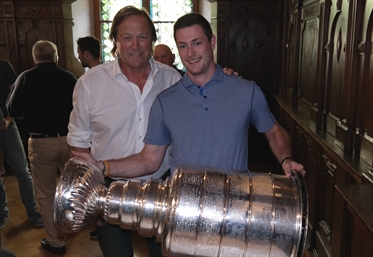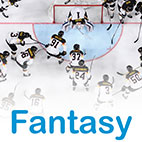Succession succeeded
Succession succeeded
Tom Kuhnhackl follows into father’s footsteps

 Pittsburgh Penguins forward Tom Kuhnhackl and his father, German hockey legend Erich Kuhnhackl, pose with the Stanley Cup at Landshut’s town hall. Photo: Martin Merk
Pittsburgh Penguins forward Tom Kuhnhackl and his father, German hockey legend Erich Kuhnhackl, pose with the Stanley Cup at Landshut’s town hall. Photo: Martin Merk
It was a big day for the Kuhnhackl family. Tom brought the Stanley Cup to his hometown of Landshut where the success story of him and his father began.
On 16 August, Kuhnhackl received the trophy at the airport of Munich. The first thing he did was take it to the ice rink in Landshut, where all youth teams of the club were waiting for him in a locker room for a photo session.
Later he took the Holy Grail to the Town Hall where the Mayor and media representatives were waiting for a Q&A session, and for Kuhnhackl to write his entry into the Golden Sports Book of the city.
Mayor Hans Rampf said that never before have so many media representatives come to the town of 70,000 inhabitants.
“We are proud to have such a talented and exceptional athlete coming from Landshut. With him and Tobias Rieder we have two role models who made all the way from Landshut to the NHL. They are idols for our youth in Landshut,” he said with Tom Kuhnhackl’s family and his long-time teammate Rieder, who followed him on-site during the final series, in attendance.
“I still haven’t realized 100 per cent what I’ve reached two months ago. It was clear for me that I’d bring the Stanley Cup to my hometown where it all started,” Kuhnhackl said.
“It’s extraordinary to win the trophy. It may take a while until it will be in Germany again,” the 24-year-old Bavarian added. “In this locker room we had the trophy this morning everything began 20 years ago, it was an honour I could bring the Cup to Landshut.”
Outside at the town hall square he presented the trophy to roughly 2,000 fans who later lined up to get a photo with the Cup and their hometown hero. Then he continued the celebration in a smaller circle with the family.
Kuhnhackl played for the juniors and two years with the senior team in the second-tier league before being drafted by the Penguins in the fourth round in 2010. He immediately moved to North America, played two years as a junior in the OHL and four years in the Penguins organization. He spent most of the time with the farm team, which was where his season started in 2015/2016. Only in January did he have his NHL debut in Montreal during a road trip.
Since then he has played 42 regular-season games and 24 playoff games, and won a Cup.
“It’s a dream for every hockey player to make the NHL and win the Stanley Cup. To make it in the first year is like a dream,” Kuhnhackl said. “Now we have to make sure to make the playoffs and try to defend the title. I’m still the same person. I was accepted well into the team, they integrated me well. I hope to make a good job in the new season.”
“He fought it out and had the will to play in the NHL and the portion of luck you need when Pittsburgh changed the coach and took three players from the farm team,” his father Erich said about the intense year.
“The Penguins had a run. Everybody gelled together from the goalie to the youngest player. That he would be here after half a year with the Stanley Cup was something he had probably just dreamed of. He’s one who when he gets something into his head tries to put it into practice. He’s always looking for a new challenge.”
Erich Kuhnhackl was voted as German player of the century in 2000. He grew up as a son of German parents in Czechoslovakia and played in Sokolov until 1968, when the Soviet army invaded the country and his family emigrated to Germany. The same year he debuted in the top German league for EV Landshut. He would play 21 years of top-level hockey, mostly in Germany (16 years for Landshut, three for Cologne) and two seasons in Olten, Switzerland. Due to his size of 196 cm the forward was also nicknamed wardrobe on skates.
“I played hockey and know what the Stanley Cup means for a player. Unfortunately I’m already 65 and won’t make it anymore but my son Tom made it. That feels like I’ve done it too,” he said when asked to pose with his son beside the Cup.
In Germany he’s still a living hockey legend.
“I can’t describe the feelings. I’m very proud that my son won the Stanley Cup. For a player winning the Cup is very important and motivating, for our club as well. For German hockey in general it’s something unique. I hope it will have a very positive effect and that everybody who has anything to say in hockey will work together and not against each other like at the Pittsburgh Penguins when they won the Stanley Cup,” he said and added with a smile: “They used to say he’s Erich’s son, now they’ll say I’m Tom’s father.”
Also his son had to smile but disagrees. “It’s nice that he says that but when looking at what my father has reached and the records he has set he will remain as the best German player forever and I’m just glad to have him as father and role model,” he said.
Erich Kuhnhackl won four national championships and was an eight-time scoring leader of the German league. With West Germany he won Olympic bronze in Innsbruck 1976 and became the first scoring leader from Germany at the Olympics (1976, 1984) and World Championships (1978). He represented Germany in 211 international games including three Olympics and ten World Championship events (eight in the top division).
The IIHF Hall of Fame member later worked as a coach in the German league, led the German U20 national team and was part of the men’s national team coaching staff. Until 2014 he served as Vice President of the German Ice Hockey Association.
Many hockey fans during his era wondered how he would have done in a stronger league.
“I once had an offer from the New York Rangers while I was playing in Cologne. I was a professional player and at that time earned a lot of money in Germany. I was for a while at the camp [of the Rangers]. But with 27, 28 it was also a question where I’d earn more and at that time one could earn a lot [in Germany],” Kuhnhackl said about the playing possibilities during his era, when the salaries in the NHL were modest compared to today.
The merits in international play are something he has over his son but he wishes Tom and the national team could enjoy the same success. Since his Olympic bronze in 1976 Germany hasn’t won a medal in a top-level event.
“Of course I wish my own son and the German national team that they qualify for the Olympics and that with some luck at the Olympics they can come as far as possible. But it’s a long way there. Let’s hope for the best,” he said.
Tom Kuhnhackl obviously got some hockey genes from his father. He started to play ice hockey since his family did so including his older sister and brother, who started before him.
“It’s not like my father or family said ‘you have to play hockey’. As a kid I played tennis, golf, football (soccer), hockey, tried everything but at some point I decided to focus on hockey because my father and all my family played hockey, so I wanted to do the same,” the young Kuhnhackl said about his childhood.
“Since he was one of the best German players I wanted to see whether I can achieve the same one day.”
The forward almost makes a down-to-earth impression for a player who just hoisted the trophy of the biggest hockey league in the world two months ago.
“Nothing has changed for me, even if it sounds strange. Just that the summer break has become shorter and you have to make sure you’ll get in shape like in the year before,” he said.
The break is short indeed. Soon the German national team will convene to prepare for the Final Olympic Qualification and travel to Riga. Host Latvia has won such an event four consecutive times, Austria and Japan will be the other opponents in the group.
“We will prepare for the Olympic Qualification in Mannheim and want to show there that we are the best team and qualify for the Olympics. Then the camp in Pittsburgh begins,” Kuhnhackl said and remains confident about the chances.
“If we look at the roster with which we go to the Olympic Qualification, with more NHL player on the team than ever, I think we have a good chance to win the tournament and go to the Olympics.”
Currently Kuhnhackl is practising off the ice in his hometown together with another NHLer from Landshut, his long-time buddy Tobias Rieder.
“We make weight training, endurance training and many sprints. Since I’m not training alone but with Tobi it helps and we can help each other when we see something is wrong. We’re motivating each other to become better,” Kuhnhackl said. “There’s no limit, you have to try to become better every day because you never know for how long your career will be.”
Having the Cup in Germany came in good timing as the country is preparing to host the 2017 IIHF Ice Hockey World Championship in Cologne, an event co-hosted with the French capital of Paris. It will be a big event. Maybe even for Kuhnhackl, who will be with the men’s national team for the first time this month?
“It depends whether I’d be free but if I’d be available with the playoffs, playing the World Championship on home ice would be an honour,” he said.
It would be a unique opportunity to follow his father’s footsteps also in international play.
Back to Overview
































































































